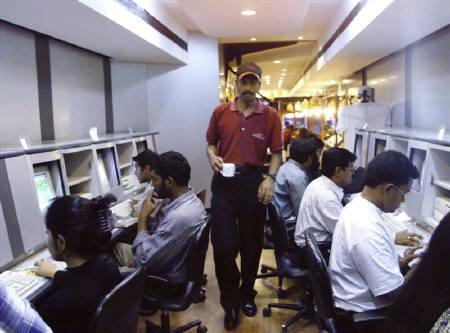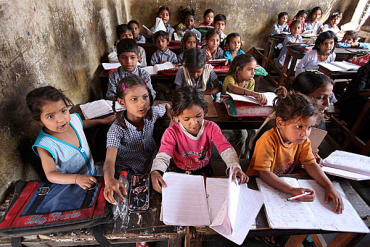Kala Seetharam Sridhar and V Sridhar
The prime minister recently remarked that if a person does well in India, he can do well anywhere in the world. But is the reverse true as well?
Brain drain - the issue that raised serious concerns in Indian economy a few years ago - is witnessing a reverse trend.
Exciting career opportunities and an association with culture has made India the favourite destination of Indian professionals with advanced degrees working in all the sectors across the world.
The last year, 2010, saw as many as 60,000 Indian professionals returning to India from the US. As one can imagine, reverse brain drain is important for India, given that it faces a talent crunch in most sectors.
...
What India should do to stop brain drain
Image: Quantifiable benefits are salaries and public services.Fully understanding the risks of quantification, these aspects are the only ones that can be quantified (family ties and the joy of being in one's own country, unfortunately, cannot be quantified).
The news on the employment front, consistent with India's growth story, is that India will see robust hiring and there is an expected double-digit salary increase across all sectors - IT, manufacturing, finance, insurance and real estate.
In India, this is another example of economic theory being wrong, or which needs to be revised.
...
What India should do to stop brain drain
Image: College graduates have higher earnings.In our own research using American data (from the Panel Study of Income Dynamics), we have found that educated individuals (those with higher grades of school completed and college degrees) have respectively 16 and 41 per cent higher earnings than their counterparts with lower education.
We also found that every extra year of work experience increases the wage by about three per cent.
...
What India should do to stop brain drain
Image: In India, wages are determined by the sector.In addition, companies dole out bonuses (of course, depending on the stage of the business cycle) and offer other perks to retain employees and prevent attrition. The main reason for this phenomenon is that the IT outsourcing companies in India, typically, have a pyramid model of human resources.
...
What India should do to stop brain drain
Image: India does not offer much to those with advanced degrees.This reduces the average compensation levels in the project as well as for the whole company, thus improving its profit margins.
Does this mean that India needs no more than employees with bachelor's degrees? Hence those with master's and/or PhD degrees might be over-qualified for returning to India, especially if they are in non-IT or non-emerging sectors.
The limited number of positions, the budgetary constraints and the lengthy bureaucracy in most academic institutions in India do not offer much to those having advanced degrees.
...
What India should do to stop brain drain
Image: India does not offer public services like developed countries.Back in India, none of these exist. There should be, ideally, a quid pro quo relationship between the taxes one pays and the services one receives.
Even here, there is a lot of inequity. We all, as citizens, pay taxes (more so for the salaried, since taxes are deducted at source).
But what services do we get in return? In countries such as Finland, which rank very high on transparency and very low on corruption, citizens pay taxes but they are served by a public education system that is free (all children enjoy good-quality free primary, secondary and higher education), and a public health system of reasonable quality.
...
What India should do to stop brain drain
Image: Doctors in Finland do not refer patients to diagnostic tests unnecessarily.In India, we do have government schools, but they are of poor enough quality so that no reasonably educated parent wants to send his or her child to a government school.
In India, there are also government hospitals but no family with reasonable affordability would like to be treated in a government hospital.
...
What India should do to stop brain drain
Image: The benefit-cost analysis can be quite unfair in India.In other words, the benefit-cost analysis can be quite unfair in India for the returning expatriate. What is the government in an emerging superpower - which has now become a net lender to the Indian Monetary Fund and other agencies - doing?
At the minimum, it does not even share data essential for researchers to understand the state of the art with respect to various public services.
...
What India should do to stop brain drain
Image: Government cannot merely leverage on the fact that the country is growing rapidly.The Right to Information has arrived, but that is now used as a tool to put consumers and the public at the other end of the table with the government.
Irrespective of the rate at which India grows, we are afraid that the government in India has a long way to go, and cannot merely leverage on the fact that the country is growing rapidly.
The rapid growth is, no doubt, partly because of the policies unleashed by the government nearly two decades ago, but also a result of the demographic dividend, and a rising middle class with higher aspirations.
Hence policies to nurture higher education, better public service delivery and better sharing of data with the public need to be promoted to encourage a reverse brain drain.
Kala Seetharam Sridhar is with Public Affairs Centre in Bangalore, and V Sridhar is with Sasken Communication Technologies. These views are personal











article